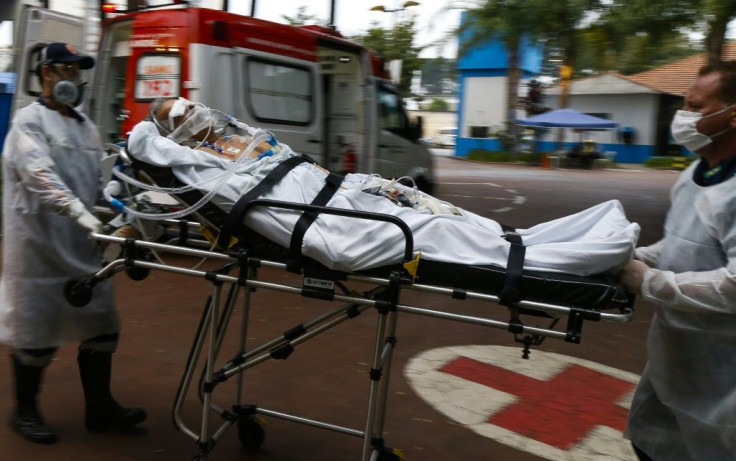The Life Of An Ambulance Driver Amid Brazil's Covid Outbreak
Carlos Marques has spent 12 years driving ambulances in Sao Paulo state but nothing prepared him for the trauma of working amid one of the world's worst outbreaks of the coronavirus.
Brazil is among the hardest-hit countries in the world and its health crisis reached a zenith this month as the daily death rate passed 4,000.
"I hope today will be a better day. We hope it won't be as bad as the others, picking up desperate people, crying," Marques told AFP, before beginning an early morning shift last week.
"At the end of the day, we're affected by it because we're with them, seeing their suffering."
Marques, 52, has first aid training and also helps the two nurses in his ambulance when necessary.
When the pandemic hit Brazil, he was contracted by a private company transporting Covid-19 patients to a hospital in Santo Andre, in the country's industrial heartland.
He worked 12-hour shifts with a day and a half off in between. He lives with his wife, daughter and four granddaughters in two humble adjoining houses in a poor town east of Sao Paulo.
He's never caught the disease and has received his first vaccination dose but fears continued exposure could affect his family.
Marques has seen his share of tragedy, such as that of a couple he transported in separate journeys.
"Both were intubated and died 10 minutes apart. On the way to the hospital, despite being ill, they were talking (to the nurses.)
"That really got to me because ... it's not easy. A couple, can you imagine that?"
This month, when Brazil passed 4,000 daily deaths, Marques drove up to 16 patients to hospitals each day.

Latin America's most populous country has recorded over 380,000 deaths among its 212 million people. More than 90,000 were in Sao Paulo state.
Only the United States has been worse affected in absolute terms, but Brazil's death rate per 100,000 inhabitants is the highest in both the Americas and the southern hemisphere.
Only the US and India have registered more cases than Brazil's 14 million.
Deaths and infections seem to have stopped climbing but still, Marques has few chances to rest during the day.
He takes a call about a patient who was supposed to be transferred to another hospital but is recovering and will soon be able to return home.
"Great!" Marques rejoiced. "Usually we pick up patients that are crying, worried. Most of them think they're going to die.
"When we pick up a patient like that, who's leaving (the hospital), that person leaves happy and us too."
Marques says he dreams of everyone being immunized in Brazil, where barely 13 percent of the population has so far received a single dose and just five percent have had the second.
"I like going home, even tired, and knowing that I'm doing a job that's important for the community," said Marques.
"Some people greet us and applaud us, some even call us heroes. It's a good job."
© Copyright AFP 2024. All rights reserved.





















